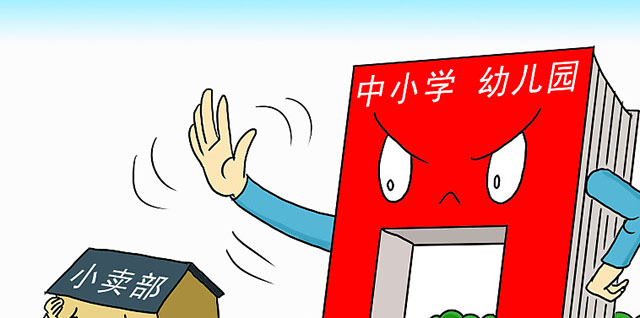
Convenience stores have been banned in all kindergartens, primary, middle and high schools in China. CFP
The campus convenience store is a place where many students enjoy a snack and a chat. However, it may become a thing of the past.
校园小卖部是不少学生买零食、聊天的好去处。然而,校园中这样的场所或许将成为过去。
China’s educational and health authorities have banned convenience stores in all kindergartens, primary, middle and high schools across the country. The regulation has taken effect since April 1.
国家教育及卫生健康相关部门已明确指出,中小学、幼儿园一般不得在校内设置小卖部、超市等食品经营场所。该规定已于4月1日起正式施行。
It requires that administrators should keep record of each meal and resolve any food problems as soon as possible. Parents can also eat with students at school canteens and give suggestions to the school on food safety and nutrition, it said.
该规定还要求相关负责人做好陪餐记录,及时发现和解决集中用餐过程中存在的问题。家长也可以在学校食堂陪餐,并就食品安全与营养健康向校方提出建议,该规定指出。
The regulation raised heated debates.
这项规定引发了热议。
Many students were sad about the ban. “Without convenience stores, our campus life will be less interesting,” a student surnamed Fang, from a senior high school in Hangzhou, told Qianjiang Evening News. “We won’t be able to have different flavored drinks or desserts.”
不少学生都对这项禁令感到难过。“如果学校没有了小卖部,我们校园生活的乐趣会少很多,”方同学是杭州的一名高中生,他在接受《钱江晚报》采访时如此表示。“我们喝不到各种各样味道的饮料,吃不到超级好吃的甜点了。”
However, many parents expressed support for the regulation.
但许多家长都对这项规定表示了支持。
The father of a junior school student in Beijing, surnamed Fang, told the Global Times that “cheap, low-quality snacks sold at these stores are harmful to children’s health.”
方先生(音译)是北京一名初中生的家长,他在接受《环球时报》采访时表示“小卖部里卖的便宜劣质零食不利于孩子们的健康。”
“Students now rush to shops to buy snacks as soon as a class is over, which affects the normal teaching order,” he said.
“现在学生们一下课就冲去小卖部买零食,影响了正常教学秩序,”他表示。
The move comes among food health concerns at public schools and is designed to meet the nutritional needs of students, The Beijing News reported. The regulation also requires schools to monitor students who may be obese, and intervene to make sure they follow a healthy diet.
据《新京报》报道,这一举措回应了人们对公立学校食品安全的担忧,并旨在满足在校学生的营养需要。该规定还要求学校加强对学生超重、肥胖的监测、评价和干预,培养学生健康的饮食习惯。
And in fact many foreign countries have their own ways to make students eat healthily.
事实上,为了让学生们吃的健康,多国都采取了相应的举措。
For example, many parents in Australia volunteer in schools, sometimes in canteens, according to China National Radio. These parents, at least, do their best to see that their children are served nutritious food.
比如,据中央人民广播电台报道,在澳大利亚,许多家长会在学校里做义工,有时也会去餐厅帮忙。至少这些家长能尽力让自己的孩子吃上富含营养的食物。
In Japan, there is “food and nutrition education”. Primary and junior high school students eat lunch in their classrooms, where they learn about diet and nutrition, and Japan’s food culture, reported CityLab, an internet magazine hosted by The Atlantic. They also take turns serving meals to each other, cleaning up, and recycling.
日本则提出了“食物与营养教育”。据《大西洋月刊》旗下的互联网杂志《CityLab》报道,日本的中小学生会在教室里吃午餐,并学习饮食习惯、营养知识以及日本的饮食文化。学生们还将相互轮流打饭,清扫教室,回收垃圾。
This helps children acquire “a sense of gratitude” and “appreciate foods and social manners,” wrote Nobuko Tanaka and Miki Miyoshi, Japanese school lunch experts, according to CityLab.
据《CityLad》报道,这有助于孩子们培养“感恩之心”,并且“尊重食物和社交礼仪,”日本学校午餐专家田中延子以及三好美纪写道。










